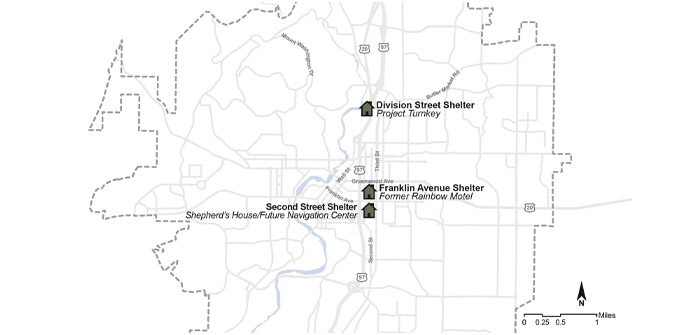(Map | Courtesy of City of Bend)
(Post Date May 4, 2022)
I wanted to start tonight talking about the Rainbow Motel, an important topic due to our earlier conversation with the Bend Central District Business Association and in relation to houselessness.
- The City has purchased the Rainbow Motel property, an opportunistic public investment that could meet a variety of short-term and/or long-term community needs, including but not limited to an immediate need for temporary shelter as well as a future possible site for City Hall, affordable housing, a civic plaza or other public uses.
- The City bought this site with General Fund dollars to allow City to be flexible in how this site can be used. We’re committed to redeveloping the Rainbow Motel property and there are many potential options for the future of that site.
- It will initially be used as a temporary shelter. The shelter will be actively managed and we are committed to ensuring it is a good neighbor in the Core Area.
- Beginning in mid-May, the Rainbow Motel property on Franklin Avenue will be temporarily used to accommodate about 44 community members in low-barrier, overnight shelter. The Franklin Avenue site will be operated by NeighborImpact for current residents of the shelter on Division Street while the City renovates the Division Street property. You may remember that we authorized a temporary contract with NeighborImpact in February for the Division Street property in order to get people in during our winter months, delaying the renovations until this month.
- Tonight, we will be voting on two contracts; one with NeighborImpact to provide management services at the Franklin Avenue shelter, and the other for renovation work at the Division Street shelter.
- Many people wonder what “low barrier” really means. A low-barrier shelter increases access to individuals and families experiencing houselessness. With a focus on reducing harm to the people using the service, low barrier shelters encourage people to seek resources by eliminating obstacles, including identification requirements and background checks, pet restrictions and sobriety mandates. But low-barrier does not mean no-barrier. Local low barrier shelters do not permit alcohol, drugs or criminal acts on site. Visitors are limited and good neighbor agreements are required. Our Division Street shelter for instance has two pages of rules for the individuals and families living within. Those who do not follow the rules are asked to leave.
- After the renovation is complete at the Division shelter, people who had relocated to the Franklin location will be able to return to the Division shelter. The Franklin property (the Rainbow Motel site) may then be used by Shepherd’s House to house people from the Second Street shelter, while renovations occur at the Navigation Center on Second Street.
- Currently, there is no plan to use the Franklin property for shelter after these two renovations are complete.
- We are also currently exploring the possibility of using the site for a collaborative office that recently secured $1 million in state funding (through HB 4123) over two years to strengthen our region’s coordinated and collaborative response to houselessness. Having the collaborative office housed in this location would be an important operationally and symbolically.
- So in summary, the Rainbow Motel is poised to be used as a shelter for approximately two to three years.
- In the next five to 10 years, we are committed to redeveloping the site on Franklin as a possible site for housing, a civic plaza, City Hall or other public uses.
We are a committed redevelopment partner for the Core Area and Bend Central District.
- The Comprehensive Plan recognizes Bend’s Central Core as having a unique potential for quality, urban-scale development and Council Goals call for stimulating redevelopment opportunities in the Core Area.
- We have formed Core Area Tax Increment Financing Plan, created a new dedicated position and a Core Area Advisory Board to oversee this.
- We purchased the Rainbow Motel property as a potential strategy to help meet the goals of the area.
I want to finish by focusing again on the strategy for addressing unsanctioned camps in our community.
- The court decisions in Martin v. Boise and Blake v. Grants Pass do not allow the City to enforce anti-camping laws if there are not enough shelter beds available for the houseless population.
- When we have more options for sheltering houseless individuals, we will be better able to address the unsanctioned camps that occur throughout Bend, including in the BCD.
- We continue to encourage community members to fill out a Service Request Form if you are concerned about unsanctioned camping, debris or safety in your neighborhood or by your place of work. You can find this form at bendoregon.gov/servicerequest.
- We are soon embarking on an unsanctioned camping code to define where and when and how people can camp on public rights of way. Please look for these discussions on upcoming Council agendas.





